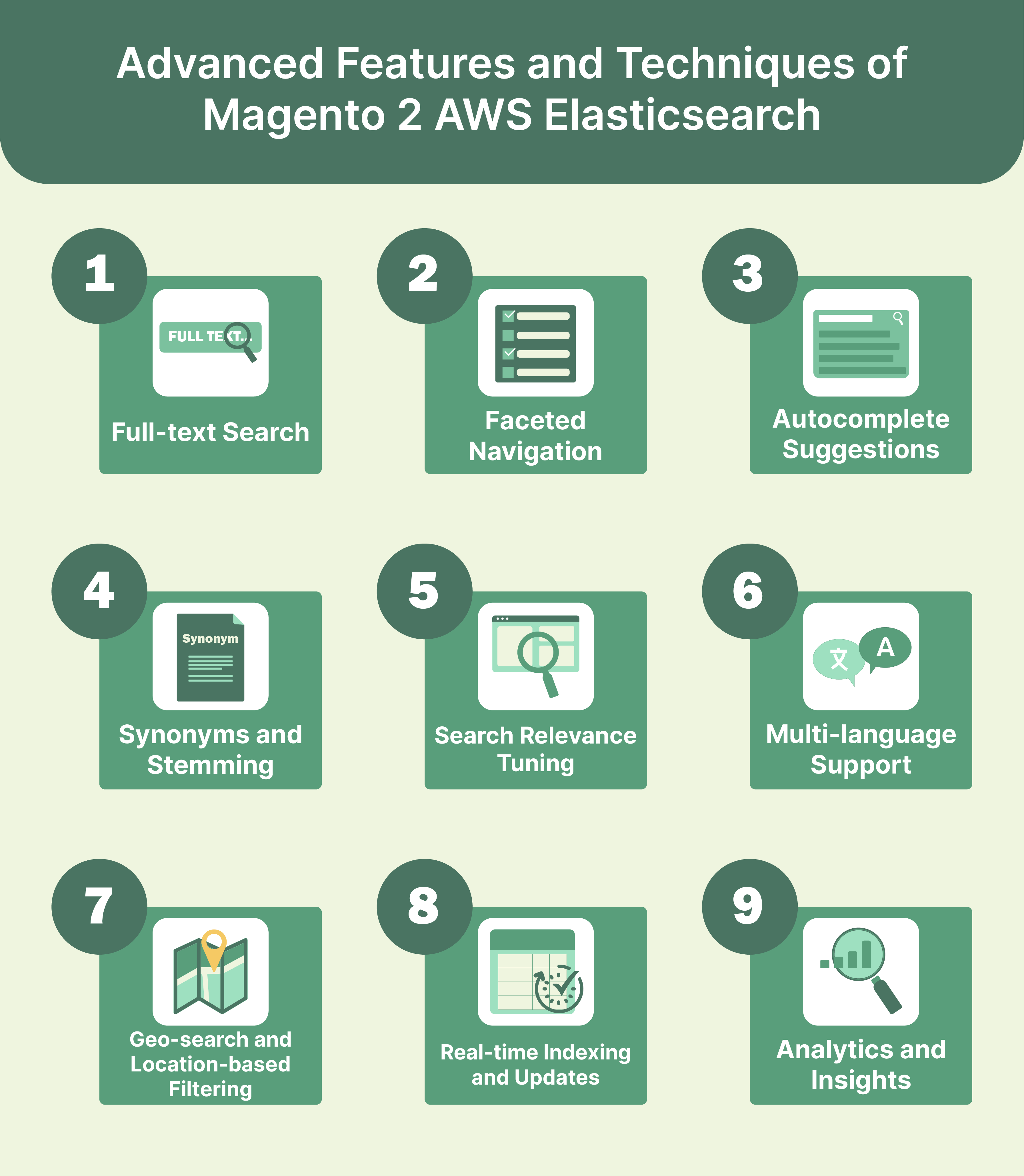
Troubleshoot the Errors in Magento 2 AWS Elasticsearch Integration
Are you facing issues with Magento 2 AWS Elasticsearch integration? Magento 2 and AWS Elasticsearch are a powerful combination to enhance the shopping experience. In this article, we will explore the benefits of this combination and the steps to troubleshoot it.
Key Takeaways
-
Learn the benefits of Magento 2 AWS Elasticsearch for enhanced shopping experiences.
-
Understand how AWS Elasticsearch handles infrastructure management, reducing operational burdens.
-
Explore advanced features like full-text search, faceted navigation, and autocomplete suggestions.
-
Discover techniques such as search relevance tuning and multi-language support.
-
Gain insights into troubleshooting steps for Magento 2 AWS Elasticsearch integration.
What is Magento 2 AWS Elasticsearch?

Magento 2 AWS Elasticsearch is a combination of Magento 2 and AWS Elasticsearch.
AWS Elasticsearch is a managed service provided by Amazon. It is used to deploy and manage Elasticsearch clusters in the cloud.
When Magento 2 is integrated with AWS Elasticsearch, Elasticsearch is used as the search engine to power the search functionality within the Magento store. The integration allows Magento merchants to leverage the scalability, reliability, and performance of AWS Elasticsearch.
Magento 2 Elasticsearch helps merchants enhance the shopping experience for their customers. AWS Elasticsearch server port also handles the infrastructure management aspects, including:
-
Provisioning
-
Scaling
-
Monitoring of Elasticsearch clusters.
It reduces the operational burden on the merchants.
Advanced Features and Techniques of Magento 2 AWS Elasticsearch

1. Full-text Search
AWS Elasticsearch provides powerful full-text search capabilities to its customers. It allows customers to search for products using natural language queries. It includes searching by:
-
Product names
-
Descriptions
-
Other relevant information.
2. Faceted Navigation
Faceted navigation is also known as faceted search or guided navigation. It allows customers to filter search results based on various attributes such as:
-
Brand
-
Size
-
Color.
It helps customers narrow down their search and find the products they're looking for.
3. Autocomplete Suggestions
Autocomplete suggestions provide real-time suggestions to customers as they type their search queries. It helps them discover products more efficiently. It also reduces the time taken to find relevant items.
4. Synonyms and Stemming
AWS Elasticsearch supports synonyms and stemming. It helps improve search accuracy by considering variations of words and their synonyms. It ensures that customers can find relevant products even if they use different terminology or spelling variations.
5. Search Relevance Tuning
With AWS Elasticsearch, you can fine-tune the relevance of search results by adjusting ranking factors such as:
-
Text relevance
-
Popularity
-
Recency
-
Other custom criteria.
It helps ensure that the most relevant products are displayed at the top of the search results.
6. Multi-language Support
Magento 2 AWS Elasticsearch supports many languages. It allows merchants to cater to a diverse customer base. They can get customers across different regions and languages. It ensures that search queries are understood and processed correctly in various languages.
7. Geo-search and Location-based Filtering
AWS Elastic search enables geo-search capabilities. It allows customers to search for products based on their location or proximity. It is particularly useful for ecommerce stores with physical locations. It is also useful for stores offering location-based services.
8. Real-time Indexing and Updates
AWS Elasticsearch supports real-time indexing and updates. It immediately reflects the changes to product data in the search index. These changes include:
-
Additions
-
Updates
-
Deletions.
It also helps maintain the freshness and accuracy of search results.
9. Analytics and Insights
AWS Elasticsearch provides powerful analytics and insights into search behavior. It allows merchants to track:
-
Popular products
-
Conversion rates
-
Other key metrics.
The data can be used to:
-
Optimize search performance
-
Merchandise strategies and customer experience.
Steps to Troubleshoot Magento 2 AWS Elasticsearch
1. Verify AWS Elasticsearch Configuration
Ensure that your AWS Elasticsearch domain is properly configured. Check the:
-
Access Policies
-
Security groups
-
Network settings.
It helps confirm that your Magento 2 store can communicate with Elasticsearch.
2. Check Elasticsearch Service Status
Verify that your AWS Elasticsearch service is running without any issues. You can check the service status from the AWS Management Console or using AWS CLI commands.
3. Review Magento 2 Configuration
Check Magento 2 configuration files (app/etc/env.php or Admin Panel configurations). You should confirm that the Elasticsearch details are correctly set, including:
-
Host
-
Port
-
Any authentication.
4. Test Elasticsearch Connectivity
Use command-line tools like cURL or Postman. It helps test the connectivity between Magento 2 and AWS Elasticsearch. You can send a simple query to Elasticsearch to ensure that it responds as expected.
5. Check Elasticsearch Indexes
Verify that Magento 2 indexes are properly created and synchronized with Elasticsearch. You can check this through the Magento 2 Admin Panel. You can also check this by running Magento CLI commands like
-
bin/magento indexer:status
-
bin/magento indexer:info.
6. Review Logs for Errors
Check Magento 2 logs (var/log/). It helps detect any errors related to Elasticsearch connectivity or indexing. Look for specific error messages that might state the root cause of the problem.
7. Enable Elasticsearch Debug Mode
If necessary, enable debug mode for Elasticsearch in Magento 2 configuration. It can provide more detailed error messages and help in diagnosing the issue.
8. Track System Resources
Ensure that the server hosting Magento 2 has enough resources available, including:
-
CPU
-
Memory
-
Disk space.
It helps handle Elasticsearch queries and indexing tasks.
9. Review AWS Elasticsearch Metrics
Check AWS Elasticsearch metrics like:
-
CPU use
-
Memory usage
-
Storage space.
Anomalies in these metrics could state performance issues or resource constraints.
10. Consult Magento Community and AWS Support
If you're unable to resolve the issue on your own, reach out to the Magento community forums. You can also reach out to AWS support for help. Other users or experts might have encountered similar issues and can provide guidance.
11. Update Magento and Elasticsearch Versions
Ensure that you are using compatible versions of Magento 2 and AWS Elasticsearch. Updating to the latest versions might resolve compatibility issues and improve performance.
12. Consider Professional Support
If the troubleshooting process becomes complex or time-consuming, consider hiring professional Magento developers. You can also hire Elasticsearch consultants who can offer specialized help. These services will be tailored to your specific requirements.
FAQs
1. What role does cache play in Magento 2 AWS Elasticsearch Integration?
Cache optimizes performance by storing frequently accessed data locally. It optimizes server resources and ensures smoother browsing experiences for customers. It also reduces latency for search results and catalog information.
2. How does Magento 2 AWS Elasticsearch Integration enhance catalog search functionality?
It leverages Elasticsearch's powerful search capabilities. These include lightning-fast searches, fuzzy matching, synonym support, and relevance-based sorting. It ensures quick and accurate results.
3. How can I configure the server hostname in Magento 2 AWS Elasticsearch Integration?
Access Magento's admin interface, navigate to Elasticsearch configuration and specify the server hostname. The support and documentation of Adobe simplifies the process.
Summary
Magento 2 AWS Elasticsearch integration enhances the shopping experience in Magento stores. This article also uncovers:
-
AWS Elasticsearch serves as a managed service for deploying and managing Elasticsearch clusters.
-
This powerful search functionalities it offers such as full-text search and faceted navigation.
-
Features like synonyms and stemming, search relevance tuning, and multi-language support.
-
Troubleshooting steps for Magento 2 AWS Elasticsearch integration include verifying configuration settings.
Want to experience the benefits of Magento 2 AWS Elasticsearch integration? Consider connecting it with managed Magento hosting to multiply the benefits.



